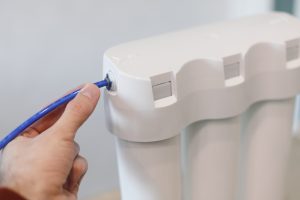The Benefits of Water Treatment and How It Can Improve Your Health
 Water is essential to life, and proper water treatment is essential to having safe, clean water. Water treatment is the process of cleaning and purifying water to make it safe for human consumption. It can be used to remove contaminants, reduce the risk of waterborne illness, and improve the taste, smell, and clarity of the water. Water treatment can have many positive health benefits, including reducing the risk of waterborne illness and improving the quality of drinking water. It can also provide clearer, better-tasting water, making it more pleasant to drink. Additionally, water treatment can help to remove chemical contaminants and other pollutants, making it safer to drink. By understanding the benefits of water treatment and how it can improve your health, you can make sure that you and your family are drinking safe and healthy water.
Water is essential to life, and proper water treatment is essential to having safe, clean water. Water treatment is the process of cleaning and purifying water to make it safe for human consumption. It can be used to remove contaminants, reduce the risk of waterborne illness, and improve the taste, smell, and clarity of the water. Water treatment can have many positive health benefits, including reducing the risk of waterborne illness and improving the quality of drinking water. It can also provide clearer, better-tasting water, making it more pleasant to drink. Additionally, water treatment can help to remove chemical contaminants and other pollutants, making it safer to drink. By understanding the benefits of water treatment and how it can improve your health, you can make sure that you and your family are drinking safe and healthy water.
What is water treatment?
Water treatment is the process of cleaning and purifying water to make it safe for human consumption. It can be used to remove contaminants, reduce the risk of waterborne illness, and improve the taste, smell, and clarity of the water. Water treatment can be done in a number of different ways, depending on the type of contaminants that need to be removed. This process usually occurs in three stages: pretreatment, treatment, and post-treatment. Pretreatment occurs before the water is treated, while treatment takes place during the water treatment process. Post-treatment refers to the end of the water treatment process. Types of water treatment include filtration, chemical treatment, ultraviolet (UV) light disinfection, distillation, and Reverse Osmosis (RO).
Benefits of water treatment
Water treatment can have many positive health benefits, including reducing the risk of waterborne illness and improving the quality of drinking water. It can also provide clearer, better-tasting water, making it more pleasant to drink. Additionally, water treatment can help to remove chemical contaminants and other pollutants, making it safer to drink. By understanding the benefits of water treatment and how it can improve your health, you can make sure that you and your family are drinking safe and healthy water.
Health benefits of water treatment
– Reducing the risk of waterborne illness – Improving the quality of drinking water – Providing clearer, better-tasting water – Removing chemical contaminants and other pollutants – Safer to drink – Healthier skin, hair, and nails – Improved oral health – Healthier teeth – Healthier digestion – Lower risk of kidney stones – Healthier liver function – Lower risk of certain cancers – Improved heart health – Improved mental health – Improved skin, hair, and nails – Improved oral health – Healthier teeth – Healthier digestion – Lower risk of kidney stones – Healthier liver function – Lower risk of certain cancers – Improved heart health – Improved mental health
How water treatment can reduce the risk of waterborne illness
– Bacteria, Viruses, and Parasites – Pathogens – Parasites – Viruses – Bacteria – How water treatment can reduce the risk of waterborne illness – How water treatment can reduce the risk of waterborne illness – How water treatment can reduce the risk of waterborne illness
How water treatment can improve the quality of drinking water
– Poor water quality – Hard water – Bad taste and smell – Cloudiness – Sediment – Chemical contaminants – Organic material – How water treatment can improve the quality of drinking water – How water treatment can improve the quality of drinking water – How water treatment can improve the quality of drinking water
How water treatment can remove chemical contaminants and other pollutants
– Pollutants in drinking water – Contaminants in drinking water – Bad taste and smell – Cloudiness – Sediment – Chemical contaminants – Organic material – How water treatment can remove chemical contaminants and other pollutants – How water treatment can remove chemical contaminants and other pollutants – How water treatment can remove chemical contaminants and other pollutants
Different types of water treatment
– Filters – Chemical treatment – UV light disinfection – Distillation – Reverse Osmosis (RO) – How water treatment can improve the quality of drinking water – How water treatment can improve the quality of drinking water – How water treatment can reduce the risk of waterborne illness – How water treatment can reduce the risk of waterborne illness – How water treatment can remove chemical contaminants and other pollutants – How water treatment can remove chemical contaminants and other pollutants – How water treatment can improve the taste, smell, and clarity of drinking water – How water treatment can improve the taste, smell, and clarity of drinking water – How water treatment can reduce the risk of waterborne illness – How water treatment can reduce the risk of waterborne illness – How water treatment can improve the taste, smell, and clarity of drinking water – How water treatment can improve the taste, smell, and clarity of drinking water – Health benefits of water treatment – Health benefits of water treatment
The importance of regular water testing
Regular water testing is an important part of water treatment. It can help to identify contaminants present in the water, levels of bacteria, and other factors that can affect the water quality. Water testing can also help to determine the best water treatment method to use. By regularly testing the water, you can make sure that your water treatment system is working properly and that your family is drinking safe water.
Understanding the cost of water treatment
Water treatment is an important part of keeping your family safe and healthy. While it is important to have a water treatment system in place, it does come with a cost. By understanding the cost of water treatment, you can better prepare for the installation and upkeep of your water treatment system. The cost of water treatment will depend on a number of factors, including the type of water treatment used, system size, and the type of water source. Different types of water treatment are each designed for a different water source, so you’ll need to decide which type is best for your situation. The type of water treatment you choose will largely depend on the quality of your water source.
Conclusion
Water is essential to life, and proper water treatment is essential to having safe, clean water. Water treatment is the process of cleaning and purifying water to make it safe for human consumption. It can be used to remove contaminants, reduce the risk of waterborne illness, and improve the taste, smell, and clarity of the water. Water treatment can have many positive health benefits, including reducing the risk of waterborne illness and improving the quality of drinking water. It can also provide clearer, better-tasting water, making it more pleasant to drink. Additionally, water treatment can help to remove chemical contaminants and other pollutants, making it safer to drink. By understanding the benefits of water treatment and how it can improve your health, you can make sure that you and your family are drinking safe and healthy water.
